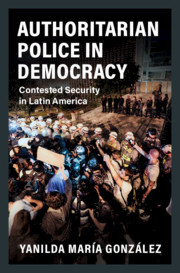Description
Authoritarian Police in Democracy
Contested Security in Latin America
Cambridge Studies in Comparative Politics Series
Author: González Yanilda María
Explains the persistence of violent, unaccountable policing in democratic contexts.
Language: English
Subject for Authoritarian Police in Democracy:
40.64 €
In Print (Delivery period: 14 days).
Add to cart
Authoritarian Police in Democracy
Publication date: 11-2020
Support: Print on demand
Publication date: 11-2020
Support: Print on demand
Dissonant Security
Publication date: 11-2020
250 p. · 23x15 cm · Hardback
Publication date: 11-2020
250 p. · 23x15 cm · Hardback
Description
/li>Contents
/li>Biography
/li>
In countries around the world, from the United States to the Philippines to Chile, police forces are at the center of social unrest and debates about democracy and rule of law. This book examines the persistence of authoritarian policing in Latin America to explain why police violence and malfeasance remain pervasive decades after democratization. It also examines the conditions under which reform can occur. Drawing on rich comparative analysis and evidence from Brazil, Argentina, and Colombia, the book opens up the 'black box' of police bureaucracies to show how police forces exert power and cultivate relationships with politicians, as well as how social inequality impedes change. González shows that authoritarian policing persists not in spite of democracy but in part because of democratic processes and public demand. When societal preferences over the distribution of security and coercion are fragmented along existing social cleavages, politicians possess few incentives to enact reform.
1. Police: authoritarian enclaves in democratic states; 2. Ordinary democratic politics and the challenge of police reform; Part I. Persistence: 3. Institutional persistence in São Paulo state: authoritarian policing by democratic demand; 4. The endurance of the 'damned police' in Buenos Aires province; 5. Policing in hard times: drug war, institutional decay, and the persistence of authoritarian coercion in Colombia; Part II. Reform: 6. 'New police', same as the old police: barriers to reform in São Paulo state; 7. The social and political drivers of reform in Buenos Aires province and Colombia; 8. Conclusion: inequality and the dissonance of policing and democracy.
Yanilda María González is Assistant Professor of Public Policy at Harvard Kennedy School. She holds a Ph.D. in Politics and Social Policy from Princeton University and was a postdoctoral fellow at the Ash Center for Democratic Governance and Innovation at Harvard Kennedy School.
© 2024 LAVOISIER S.A.S.




